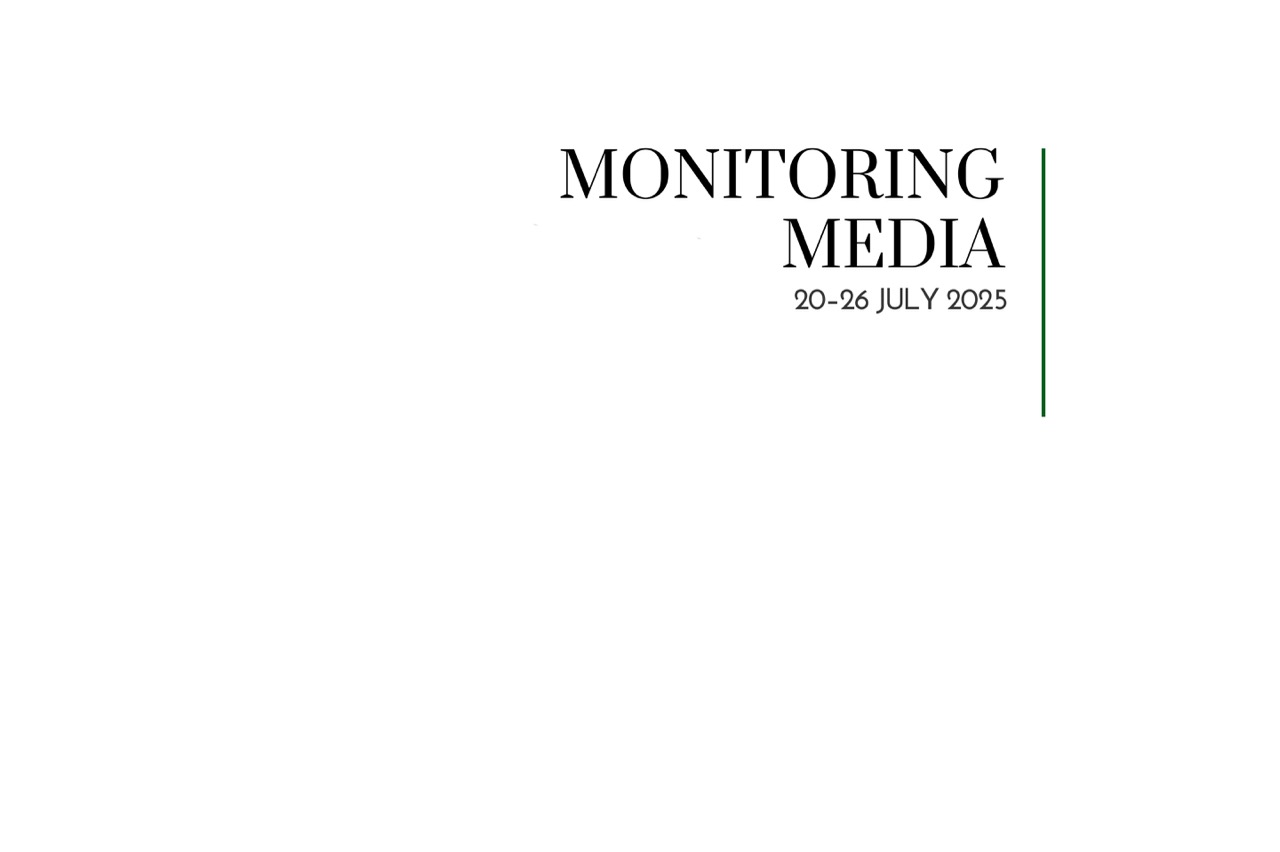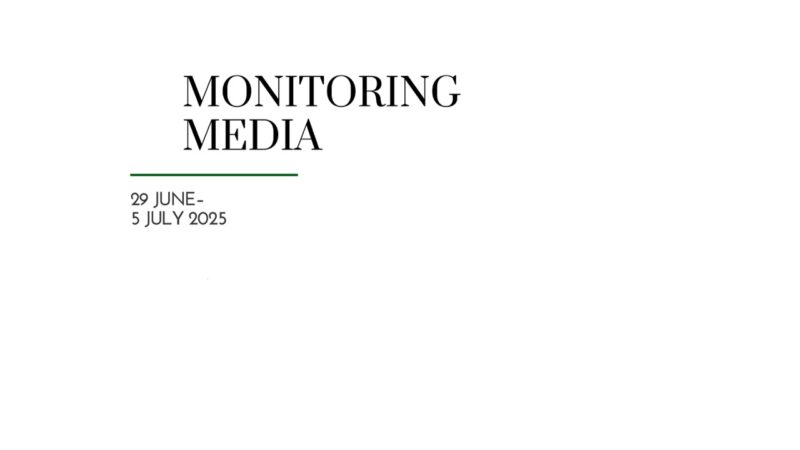Russia is losing its “near abroad”

CIUS weekly report on North American media coverage of Ukrainian affairs, 20–26 July 2025
Five publications (Foreign Affairs, The New York Times, National Interest, Foreign Policy, and The Economist) were selected to prepare this report on how Ukraine has been portrayed in the North American press during the past week. The sample was compiled based on their impact on public opinion as well as on their professional reputation, popularity among the readership, and topical relevance. These publications represent centrist viewpoints on the political spectrum.
This MMS report covers only the most-read and relevant articles about Ukraine, as ranked by the respective North American publications themselves in the past week. Its scope covers promoted articles on home pages and articles from special sections on Ukraine, with the hashtag #Ukraine, from the paper editions of the publications, and about Ukraine from opinion columns and editorials.
Featured topics
- The world and Ukraine: rules normalize life for Ukrainians; Washington may force Moscow to sit down at the negotiating table.
- Russia at war: Russia is ready to fill the USAID vacuum; Russia is losing its “near abroad”; Trump’s pressure on Putin not enough—real peace talks have yet to begin.
MMS summaries
Rules normalize life for Ukrainians. Kim Barker (New York Times) suggests that rules and routine activity for Ukrainians are a tool for normalizing life in the context of Russia’s war on their country. For those visiting Ukraine for the first time, the difference between the front lines and peaceful territory is clearly visible: “Complicated espresso drinks are still sold at gas stations; pizza and sushi are still on offer; and rave parties still rave, even if they end at 11 p.m., in time for the midnight curfew.” The desire for order is a protective mechanism that has allowed Ukrainians to bear the burden of full-scale war with dignity for nearly four years now: “Traffic lights seem to be the most obvious sign of how Ukrainians hold onto normalcy. Red means stop. Green means go. There is no yellow light here, no caution, no chancing it. Even during air-raid alarms.” According to Barker, “The sum of all these habits creates the impression of normal life, which is something many people deeply need.”
Russia is ready to fill the USAID vacuum. Thomas Kent (National Interest) observes that Russia is seeking to expand its influence in the Global South by taking advantage of the vacuum created by the de-funding of the United States Agency for International Development (USAID). Moscow wants to copy the USAID model: “Russia does not publish full statistics, but analysts estimated its total annual aid at slightly over $1 billion before the full-scale invasion of Ukraine. And most Russian aid goes to post-Soviet countries and a small number of other nations—mainly in the Global South—where assistance ‘[cor]responds to Russia’s national interests.’” The vacuum created by the withdrawal of USAID allows the Kremlin to achieve better results with less effort: “[Yevgeny] Primakov [Jr.] said his agency is expanding now in Africa, including in Angola, Mali, and Algeria. Still, Russia has never been much inclined to costly, extensive on-the-ground development work.” According to Kent, “To be sure, Russia won’t become a big aid player overnight…But the interest is clearly there. Similarly, there is an understanding that as America scales back its international profile, there is now an opportunity for the Kremlin to enhance its own.”
Washington may force Moscow to sit down at the negotiating table. Corban Teague (National Interest) believes that tougher sanctions against Russia are not a panacea, but they can put significant pressure on Moscow, forcing it to sit down at the negotiating table. President Donald Trump and his voters sincerely want to see the US as a major player on the world stage and recognize that decisive displays of strength are sometimes necessary to achieve peace: “The [public opinion poll] results showed unequivocally that Trump voters are overwhelmingly in favor of strong, principled, and proactive American leadership in the world. Notably, among the various groups of Trump voters polled, the self-identified ‘MAGA’ voters voiced more support for this approach than those identifying as traditional conservatives or moderates. The poll also showed that Trump voters recognize the significant threat the United States faces from our great power adversaries—China, Russia, and Iran—and they are strongly in favor of ensuring that the United States remains the dominant global power.” Given that the Kremlin shows no willingness to come to the negotiating table, the White House must take the same decisive measures against Moscow as it has against Iran: “President Trump should pursue a ‘peace through sanctions’ strategy.” According to Teague, “Trump voters have no doubt that America’s strong, principled leadership in the world is needed, that Russia does pose a threat to America’s interests, and that Russia’s refusal to pursue good-faith peace negotiations merits a strong response. If peace in Ukraine is to have a shot, now is the time for President Trump to drop the sanctions hammer.”
Russia is losing its “near abroad.” Jeffrey Mankoff (Foreign Affairs) opines that Russia is losing control over its “near abroad” as a result of its war against Ukraine—a blow to its broader campaign to restore its “sphere of influence” in post-Soviet Eurasia: “The 2022 invasion came as a shock to many of Russia’s neighbors in [E]astern Europe, the South Caucasus, and Central Asia, confirming their fears that Russia remained a threat to the sovereignty and territorial integrity of their countries.” Russia’s painful obsession with Ukraine has created an opportunity for these countries to weaken some of the ties that bound them to their former imperial hegemon: “As the Russian military’s demand for weapons has left Moscow unable to fulfill promised exports, countries such as Armenia are turning to other suppliers in Europe and India; other regional states are purchasing weapons from Turkey and even China. And as Russia has withdrawn forces and equipment from its military bases in the Caucasus and Central Asia to redeploy them to Ukraine, countries in both places are resolving conflicts that Russia has long exploited for its own benefit.” Once the fighting in Ukraine subsides, the Kremlin will almost certainly intensify its efforts to compel other neighbours to join Russian-backed multilateral organizations, strengthen economic ties, adopt Russian-style laws, and accept a greater presence of Russian military and intelligence forces on their territory. Thus, it is important for the USA, together with its European allies, India, Israel, Japan, South Korea, Turkey, and the UK, to make new investments in cross-border infrastructure, supply chains, defence, and strong diplomatic cooperation to strengthen regional stability: “Countries in the region will continue to search for their own ways to reduce their historic reliance on Moscow—but Washington and its partners should help them tip the scales.”
Protests in wartime Ukraine reveal its democratic resilience. Christian Caryl (Foreign Policy) draws an unfavourable comparison between Volodymyr Zelensky and Winston Churchill, warning that unlike the British wartime leader, Zelensky is showing signs of consolidating power and marginalizing his critics. Caryl argues that Churchill “never succumbed to the temptation to exercise autocratic power,” even during a global war, while Zelensky’s recent attempt to place Ukraine’s anti-corruption bodies under the control of the chief prosecutor triggered mass protests across the country. “This is what Zelensky forgot,” said anti-corruption activist Daria Kaleniuk. “He didn’t expect that there would be such an outcry in society in response to his act to demolish anti-corruption organizations.” The backlash, the author suggests, signals that the president risks alienating Ukrainian civil society at a time when the country needs unity more than anything. Although the protests sparked concern about internal instability, civic resistance remains one of Ukraine’s greatest strengths. The demonstrations, which spread from Kyiv to other cities, are “precisely the fact that Ukraine’s civil society takes to the streets, protests, and keeps kicking its own government in the ass even during wartime,” Ukrainian journalist Illia Ponomarenko is cited as declaring. This grassroots energy is central to Ukraine’s resilience and democratic character, according to Caryl. Despite concerns over Zelensky’s leadership style and a possible crackdown on dissent, Ukraine’s civic activism remains—keeping vigilant over the deeds of its own government but also forming the bedrock of its ability to endure and resist Russian aggression.
Structured framework needed to sustain Ukraine-Russia peace talks. Juan Manuel Santos (Economist) calls for a structured framework to guide Ukraine-Russia peace negotiations, warning that current talks could falter without one. Drawing on his experience in Colombia’s peace process, Santos, who is a former Colombian President and Nobel Peace Prize laureate, notes that “forging peace takes time” and argues that establishing a draft negotiation framework—with input from neutral third-party countries trusted by both sides—could be a crucial step toward meaningful progress in Ukraine-Russia peace talks. Drawing parallels to Colombia’s successful peace process with the Revolutionary Armed Forces-People’s Army (FARC-EP), he highlights the 2012 “General Agreement,” a structured document with a six-point agenda that guided the country toward a comprehensive peace deal. He suggests that a similar roadmap tailored to Ukraine’s needs could address key issues such as ceasefire terms, political participation, victims’ rights, and post-war security guarantees. Santos writes that negotiations are most effective when conducted behind closed doors because “it is only in confidential discussions that real positions can be tested and other areas of mutual interest explored.” He also proposes that the UN should play a key role in monitoring any future ceasefire, as it did in Colombia, and insists that European leaders and NATO must be included in the broader process due to the war’s deep implications for regional stability.
MMS takes a closer look:
Structured framework needed to sustain Ukraine-Russia peace talks. Juan Manuel Santos (Economist) calls for a structured framework to guide Ukraine-Russia peace negotiations, warning that current talks could falter without one. Drawing on his experience in Colombia’s peace process, Santos, who is a former Colombian President and Nobel Peace Prize laureate, notes that “forging peace takes time” and argues that establishing a draft negotiation framework—with input from neutral third-party countries trusted by both sides—could be a crucial step toward meaningful progress in Ukraine-Russia peace talks. Drawing parallels to Colombia’s successful peace process with the Revolutionary Armed Forces-People’s Army (FARC-EP), he highlights the 2012 “General Agreement,” a structured document with a six-point agenda that guided the country toward a comprehensive peace deal. He suggests that a similar roadmap tailored to Ukraine’s needs could address key issues such as ceasefire terms, political participation, victims’ rights, and post-war security guarantees. Santos writes that negotiations are most effective when conducted behind closed doors because “it is only in confidential discussions that real positions can be tested and other areas of mutual interest explored.” He also proposes that the UN should play a key role in monitoring any future ceasefire, as it did in Colombia, and insists that European leaders and NATO must be included in the broader process due to the war’s deep implications for regional stability.
MMS notes that while the lessons learned from Colombia’s peace agreement may offer valuable insights into the structure and process of peace talks, it is important to acknowledge a fundamental distinction between the two situations. Colombia’s peace process with FARC was a resolution to a decades-long internal conflict between a state and a non-state armed group. In contrast, the war in Ukraine is a case of one sovereign nation engaging in full-scale aggression against another. This difference in the root cause means that while a structured framework could be beneficial, the political, legal, and international security guarantees required for a lasting peace settlement in Ukraine will likely be far more complex than those in the Colombian model.





